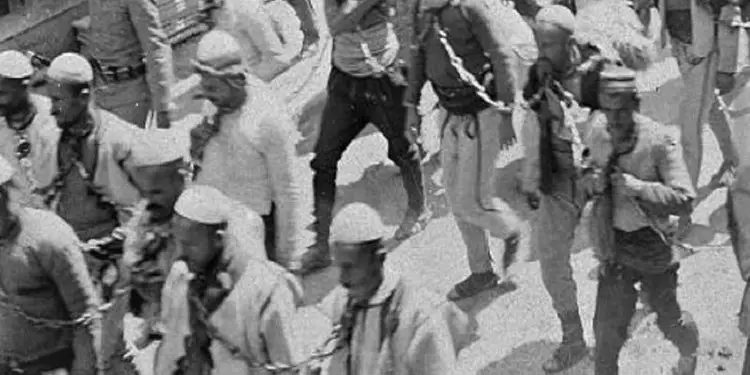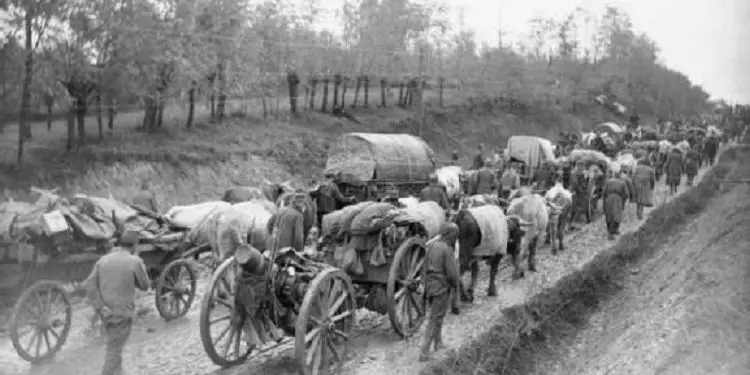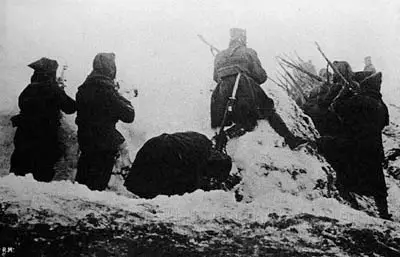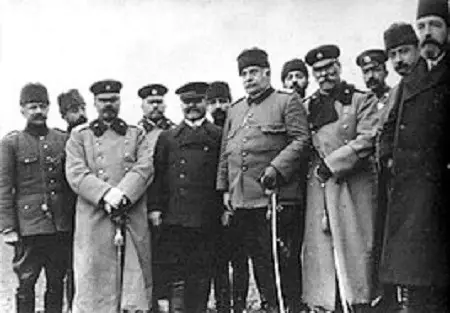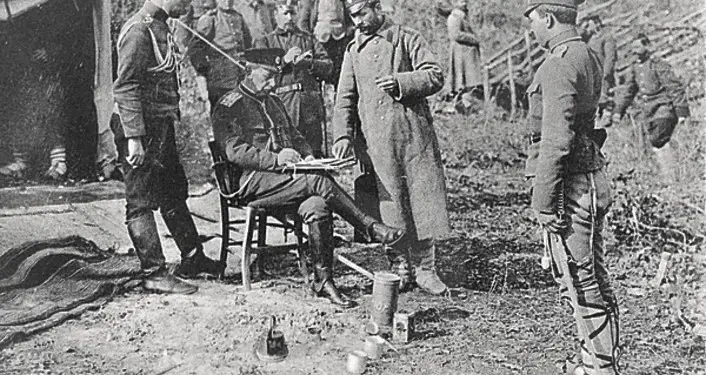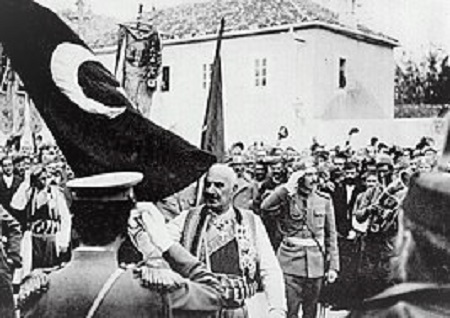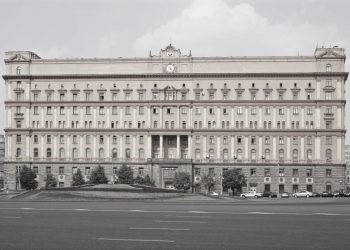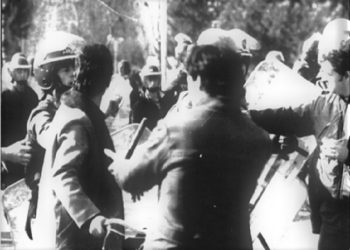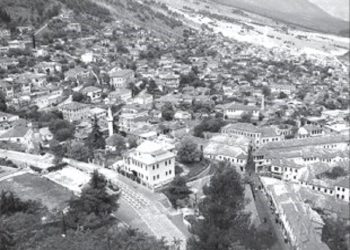From Bashkim Trenova
The third part
ALBANIANS ACCORDING TO THE SERBS
(THE EASTERN CRISIS AND THE BALKAN WARS)
Memorie.al / “Serbs are descended from the Slavs, a large number of tribes who gave life to the Slavic peoples. Knowledge about the origins of the history of the Slavs is modest and not so clear. Their name appears for the first time in the 6th century AD, when Byzantine writers begin to talk about the Slavs…”! (Dushan Bataković, Milan St. Protic, Nikola Samardžić, Aleksandër Fotic. History of the Serbian People. L’Age d’Homme. Lausanne. 2005. Pg. 3.)
INSTEAD OF THE PROLOGUE – A PROJECT, TWO MEMORANDA AND AN ANALYSIS
The Project or Nacertania of Ilia Garasanin – politician, prime minister of Serbia during the years 1852-1853 and 1861-1886:
On February 10, 1865, the government of Prince Mihailo announced the law “For the colonization of foreigners in Serbia”. Under the terms of this law, the Serbian government provided each of the poor settlers in the surrounding areas with three jutras (1 acre = 0.6 hectare) of arable land and three jutras of uncultivable land, a house, two oxen, a cart , two goats or sheep, a sow, the necessary tools and 120 grošas in cash. In addition, he gave them, of course, corn until their first harvest.
One plow was allocated to two settler families. Movable and immovable properties were given to the settlers on inalienable loans for a period of fifteen years. After this time, they became their property. For five years the colonists were exempted from all taxes to the state, they were exempted for ten years from military service, in the regular army and for five years from service in popular units.
This created such a reverberation that, within a few months, all the lands were occupied by settlers and this on a scale which we did not reach for several years after the war. If the state had given the same favors to the settlers after 1918, our situation would be different in Vojvodina and southern Serbia. This is how we must act in the future, if we want to be successful.
The method of colonization of Toplica and Kosanica after 1878, after the emptying of these provinces by the Albanians, is also instructive. The law of January 3, 1880, regulated the colonization of these regions. On February 3 of the same year, the People’s Assembly approved the law on agrarian relations according to the principle: “Land to the peasants”. Serbia, without delay, contracted the first loan abroad, to pay Turkey for the lands it had taken. A Ministry of Agrarian Reform was not created or an expensive apparatus to deal with colonization, but everything was done quickly and practically.
Police bodies distributed the land to all those who wanted to work it. As a result, we saw the arrival of people from Montenegro, Sjenica, Vranje, Kosovska, Peja, etc., and thirty years after 1878, Toplica and Kosanica, formerly called Arnautlik with a sad reputation, gave Serbia its most good, the II iron regiment, during the wars of 1912-1918. With the blood shed by their sons in these wars, Toplica and Kosanica paid multiples of several tens of millions of dinars, which Serbia had previously spent on their settlement.
Therefore, only by following this example and being aware of what needs to be done, saving neither money nor blood, our country will be able to make Kosovo and Metohija a new Toplica. Thus, in a few years, we must provide the settlers with all the necessary conditions of existence, if we want them to stay where they are.
We must mercilessly suppress any speculation about the homes and properties of displaced Albanians. The state must retain the unlimited right to dispose of their movable and immovable property and to settle there, after their departure, its inhabitants. This is necessary because rarely will an entire village be emptied at once. First we have to put Montenegrins in these villages, because they are arrogant, hot-tempered and wild and with their attitude they will force the remaining Albanians to leave, then we have to bring settlers from other countries…!
Colonization technique
….No action requires as much persistence and attention to implement as colonization.
We have pointed out that one of the main causes of our failure in colonization both North and South was the lack of consistency in our action and the modifications which successive governments brought about in our policy. To counter this in the future, it is necessary to entrust the colonization to the General Staff…! Our army has an interest in placing its elements on our borders, especially in the most delicate sectors. In this direction, it must do everything possible; to further secure our borders through colonization as stable as possible…!
…it is necessary to establish organic links between state power, private initiatives and scientific institutions in our colonization policy. Private initiatives can act in several directions: People’s Defense, Sokolacets, Chetnik Associations, etc. they can take actions against the Albanians where the commitment of the authorities would not be shown.
… Above all, the Royal Serbian Academy of Sciences and the University of Belgrade should take the initiative to organize a scientific study of the entire problem of colonization in our country…!
The state government, for its part, will detach from certain ministries all the institutions that have dealt with this issue so far, to regroup them in a separate institution – the “Colonization Inspectorate”.
This Inspectorate will be headed by a General Inspector, appointed by decree, on the proposal of the Minister of War, the Chief of the General Staff and the Prime Minister. All the activities of the Colonization Institute, as well as the Colonization Inspectorate, will be carried out according to the instructions and under the auspices of the State Council, while the General Inspector will depend on the Chief of the General Staff.
The Colonization Institute will be divided into sections:
1) organization,
2) education and culture,
3) finance,
4) agriculture,
5) buildings,
6) hygiene etc.
These sections, in agreement with national scientific, cultural and educational associations and institutions, would study the problems of colonization; prepare guidelines, thus equipping our colonization policy with solid, scientifically processed materials on which to base decisions. .
This Institute will be directed by members of the State Council (consisting of representatives of the aforementioned ministries), of the University, of the Academy of Sciences and of private, national and cultural educational organizations, elected or appointed to this Council. In this case, it will be necessary to be careful not to choose men with honorary titles, but people who feel connection and passion for this great work…!
The inspectorate and its bodies, during their activity, should avoid bureaucratic formalities as much as possible and have only one concern: the immediate departure of Albanians and the urgent settlement of our settlers. The police apparatus will have a very important role in this matter…!
Throughout the above-mentioned area of 18 districts, it is necessary to appoint a special commissioner, who will be required to carry out the orders of the state colonization inspector. District prefects should be given full special powers and given proper instructions. We must tell our political parties that any contest in the elections in these districts is strictly prohibited and that any interference by deputies in favor of the Albanians is strictly prohibited…!
Financial means
Every time our policy of colonization has been criticized for its failures, its defenders have been justified by citing the insufficiency of the financial means made available by the state to them…! However, if funding from the state has been insufficient, it must be borne in mind that each state has its own primary and secondary interests. His primary interests include, no doubt, the task of settling in insecure national regions settlers who will ensure their protection. This duty and commitment take precedence over all others. For this we can and must find the necessary financial resources.
We have already mentioned the case of the colonization by Serbia of Toplica and Kosanica and the advantages it reaped from it. The small Serbian kingdom did not shrink from great financial sacrifices and did not hesitate, as a free and independent kingdom, to give the first loan for colonization. And our Yugoslavia of today, can’t it do the same? It can and should do so; it’s not true that she can’t handle it. Let’s make a rough calculation of how much it would cost our state to relocate 200,000 Albanians and settle an equal number of our settlers.
The transfer of 40,000 Albanian families, calculating that each family has an average of 5 members and that the expenses for each of them would reach 15,000 dinars, would cost a maximum of 600 million dinars. The expenses for settling our 40,000 families cannot exceed 200 million dinars. For this whole affair, we would not, in any case, spend more than 800 million dinars. That is why:
The displaced Albanians will leave behind not only their land, but also their houses and tools. Thus, our settlers, who for the most part will be able to settle in the old houses of the Albanians, with a little help in livestock and food, will recover and become economically independent. On this occasion, we emphasize once again that private speculation about properties left by Albanians should not be allowed at all; it is the state that must take them into hand and distribute them to the settlers.
During the creation of new settlements, military force will have to be used, where the need arises, as was the case during the construction of Gara e Sremska and the reconstruction of the southern villages destroyed by the earthquake of 1931. For this, it must be given the right and opportunity of the army to create, by attracting reservists and extending the duration of military service, a kind of compulsory service for public works, just as Stamboliski created in Bulgaria: “Trudova Povinost” (compulsory work) and Hitler in Germany: “Arbeitsdienst” (work service).
It would be especially appropriate to entrust these tasks to our young people in this sector after university studies: thus, by doing useful work in the general interest, many of these students would become more aware of these things and to see them more realistically. This could be done more easily by giving priority to the appointments to a state function of young people who have worked for a certain time in our colonization. This would also reduce the unemployment of our young intelligentsia, which is becoming an increasingly difficult social problem for us.
- In agreement with specialized organizations and companies, the least expensive means for cleaning and watering the land, draining swamps and building houses should be sought. …
- During colonization, the state can hand over properties to settlers on credit or to be paid in cash…! We emphasize that the land can only be sold to someone who proves that he will settle there and work it. The land sold on credit should not cost much, the interest rate should be minimal and the repayment of the loan should begin a few years after the settlement of the colony, that is, when the latter has recovered economically…!
In order to carry out such a national, strategic-military and economic task, the state has to sacrifice several million dinars. If he is able to spend a billion dinars on the construction of the international road from Subotica to Caribrod, from which we can have real benefits only in the distant future, how much more can and should be found these hundreds of millions of dinars, which will to allow us to regain the cradle of our state.
Conclusion
Taking into account everything that was said, not by chance, in the analysis of the colonization of the South, we start from the opinion, according to which the only effective means for solving this problem is the mass migration of Albanians. Gradual colonization has not been successful here, no more than in other countries. When the state power wants to intervene, in the interests of its own element, in the struggle for land, it can only succeed if it acts brutally. It is known that the aborigine settled in his native place and who has adapted there, is always stronger than the colony. In our case, this principle should be taken into account even more, because we are dealing with a tough, consolidated, resistant and fertile race, which the late Cvijic said is the most widespread in the Balkans (author’s emphasis).
From 1870 to 1914, Germany spent billions of marks to gradually colonize its eastern territories, buying land from the Poles, but the fertility of Polish mothers prevailed over German organization and money. Thus, in 1918, Poland took back Poznan, which belonged to her. Our statistics of the years 1921-1931, which we have already mentioned, show that the fertility of Albanian women defeated our policy of colonization.
We must draw conclusions and hurry to make the necessary corrections before it is too late. All of Europe is in a state of flux. We don’t know what tomorrow may bring. Albanian nationalism is also growing in our territories. To leave things as they are would, in the event of world conflict or social revolution, be imminent and probable, as well as to allow all our southern possessions to be called into question. The purpose of this report is precisely to avoid this situation. Memorie.al




